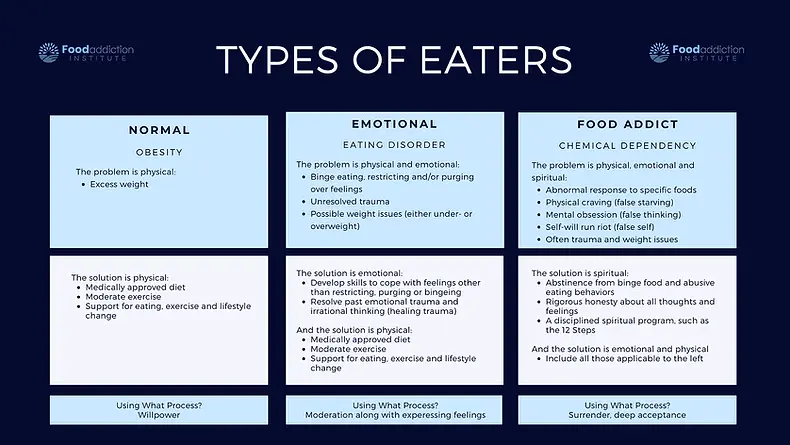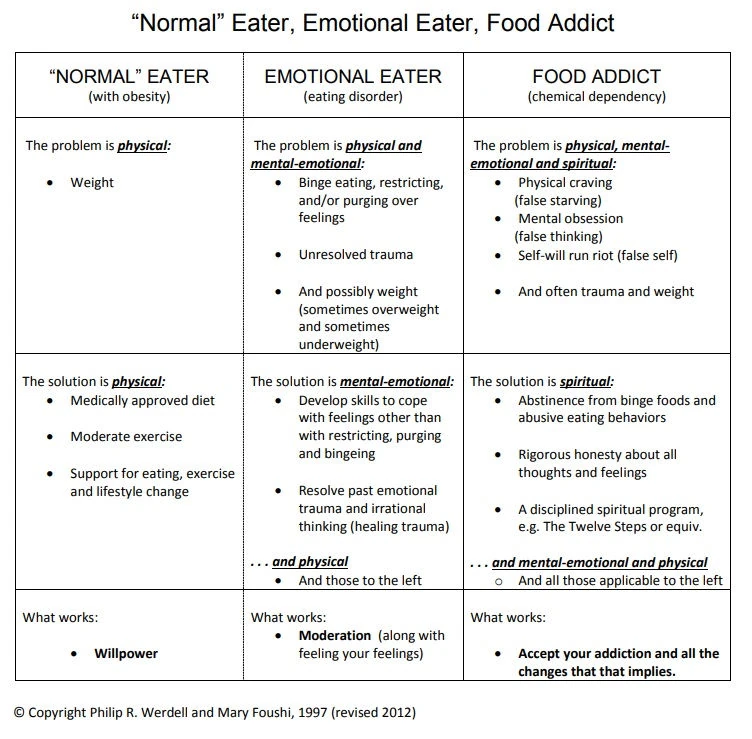Eater types are distinguished by normal, emotional and addictive eating patterns.
Normal Eaters
Normal eaters may have problems with weight (even obesity) if they do not eat the appropriate number of calories (and exercise moderately) to maintain an ideal, healthy weight. The problem for normal eaters is primarily physical.
If they choose to eat a balanced diet, exercise moderately, and get support for lifestyle changes, they can lose unwanted weight (or gain weight) and keep their weight in a normal range. Basically, willpower works; just put down the fork and push away from the table.
Emotional Eaters
Emotional eaters often have similar problems with weight but find themselves powerless to follow directions to lose (or gain) weight and restore their health even when they want to. For those with diagnosable eating disorders, i.e. anorexia, bulimia or binge-eating disorder, the underlying problem is mental-emotional.
Emotional eaters use food to numb, seek pleasure, or soothe their feelings. What works for emotional eaters is a moderate food and exercise plan, as well as developing skills to cope with feelings.
Food Addicts
Food addicts become chemically dependent on specific foods or on food in general. The way their body processes food is bio-chemically different than that of normal eaters and emotional eaters. Many food addicts are predisposed to becoming addicted to food – especially to sugar, flour, wheat, fat, salt, caffeine, and/or excess volume to any food – just as alcoholics are predisposed to being chemically dependent on alcohol and drug addicts to heroin, cocaine or prescription drugs.
As the disease of addiction progresses, food addicts become powerless over physical cravings. They develop distortions and obsessions of the mind that keep them denying they have a problem. Diets alone don’t work for food addicts. Simple therapy alone does not work.


What works for food addicts is to eliminate, through physical abstinence, the foods to which they are chemically dependent. In addition, they need to create experiences that help them find some positive meaning in their life to replace what has become an obsessive, almost uncontrollable worship of food above all else.
Most food addicts have weight problems – the majority are obese, though some are a normal weight and some may even be dangerously underweight. Many also have unresolved emotional trauma similar to those who are diagnosed with eating disorders, e.g. anorexia, bulimia, binge-eating disorder.
In short, most food addicts have problems similar to those of normal eaters and emotional eaters. However, the primary treatment for the food addict must address their addiction. Successful, long-term recovery for food addicts requires abstinence coupled with deeper internal healing from trauma, boundaries around abstinent food and structured meal plans, daily mindful practices and prioritizing loving, self-nurturing behavior.